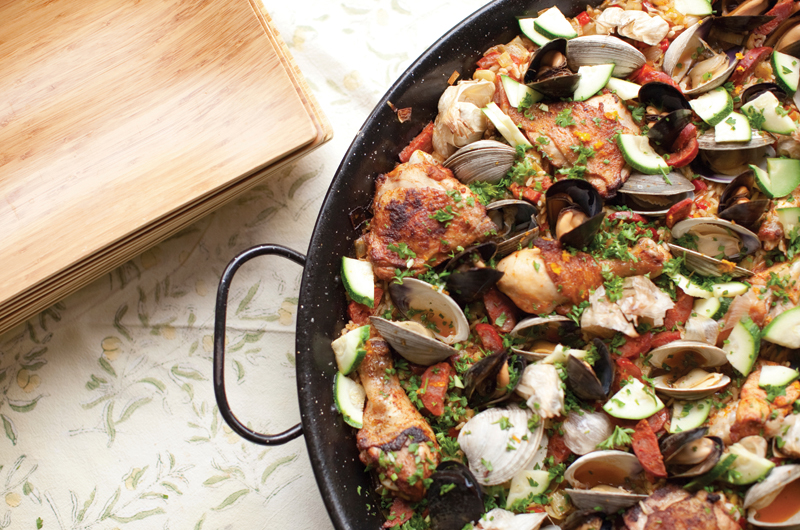Sunsets on the beach around a fire with friends – this is what I look forward to every summer. The tradition started years ago, when the kids were little. Around five o’clock we would meet at the beach with packed-up salads and something to grill, the car filled with firewood. We would swim, cook, and sit around the campfire until way past twilight. We learned about constellations, and also became experienced beach-fire builders.
We expanded our outdoor culinary repertoire when we rented a house at the edge of the Mediterranean in southern Spain one spring. It was there we first encountered beach paella. We learned about wood-fired paella techniques and skewered fish cooked over open fires by the sea. Over the years, we’ve built upon the original lessons, tweaking this and that, and we’ve learned more about the tides and paying attention to the weather.
Our beach gatherings have taught us to expect great conversations, as well as some surprises. I remember a night when a hundred or more bluefish came to shore and the water became a turbine of rapids as they chased a school of fish. The kids and dogs and adults stood mesmerized by this phenomenon of nature. Within minutes a bluefish landed on the shore and one of our brave comrades caught it by hand! And so memories become part of an anticipated summer event – an evening around the paella pan as the tide rolls in and out.
Cooking with wood on the beach can be anxiety-provoking unless you learn to go with the elements and bring along some basic necessities that make for easy cooking and cleanup. Although it is something I always anticipate with great eagerness, even I can still be a bit anxious, since one never knows what the weather may bring.
Recently we planned a paella dinner party on the beach and invited thirty friends. We had been watching the weather radar and it threatened to rain, but not enough to warrant cancelling. Unlike the tides, weather is unpredictable, especially here on Martha’s Vineyard. The wind might shift, or squalls can blow in and out, sometimes without showing up in advance on the radar. We always arrive on the beach with a willingness to adapt to the unexpected; thus prepared, as soon as I inhale the salt air and feel the grit of sand under my toes, I look forward to another memorable dinner.
The first guests arrive as we’re lighting the fire. The jolly comfort of new and old friends seems more intense in this setting. As the fire takes hold, the wind picks up and it starts to feel like it might rain. A quick check of the weather radar shows a light shower headed our way. Rich, my husband extraordinaire, heads back home and returns with two tents and some umbrellas. It still seems the weather isn’t threatening enough to cancel. The challenge begins when we have to decide what or who is going to be sheltered: the fires or the guests. The experience now becomes more intimate and fun.
Excitement builds as the senses take in the flavors. We start with some nibbles: Crostini made ahead of time with a light toasting and a rub of fresh garlic are paired with two savory toppings, a carrot dip with Moroccan spices and a white bean dip with fresh herbs.
When a friend shows up with twenty live lobsters, we start a second fire pit, so we can have them ready at the same time as the paella. Adapt and be flexible. Chipotle butter with fresh herbs is kept warm by the fire and brushed on the lobsters once they are cut in half and slightly roasted.
Paella is cooked in a paellera, a wide, shallow pan with handles on each side. I prefer the enamel-coated pans to the carbon steel, as I don’t like to deal with oiling it properly. I own several sizes, and for this group, I use the thirty-six-inch round pan.
As we’re cooking, the sky gets darker and the rain comes down harder. We have a dome cover for the lobsters, but the paella is completely exposed. I could use one of the tents, but most of the guests are gathered under them. A few are hanging out in the rain, and a few linger with me watching the pits. Will all the guests head home? I wonder. One leans over the pits and inspects them carefully. The paella is being pummeled by the rain and a bit of panic seeps in. What next? “Awesome, that is amazing,” says the guest. Relief! I reply, “There is nothing more perfect than a paella made with rainwater!” Adapt.
The lobsters are taking a bit longer than we had hoped because the rain slowed down the fire and made it smoky. The paella is cooked perfectly, but the essential paella socarrat crust hasn’t yet formed. This part can be tricky, as you want the fire hot enough to crust the rice, but not so hot that it burns or so cool that the rice cooks more and becomes soggy. I remove the pan, throw a few small pieces of wood on the coals, and get things going again. As the wood fires up, I return the paella pan to the heat and turn it slowly. As soon as I smell toast, I know we are well on our way to a good, crusty socarrat.
The sun has set. Although we missed a vibrant sunset because of the rain clouds, a tinge of pink appears in the sky as the rain stops. Now there are seventeen minutes of twilight left and it’s important to serve dinner before dark. The smoking lobsters are not cooking. I pull the paella off the fire, throw the lobsters onto the paella pit, and stir up the coals. I know they only need a blast of good heat to be fully cooked. Sure enough, by the time we get the guests’ attention, the paella is ready and so are the lobsters – they are perfect! I can’t believe the moisture they’ve retained, as I had expected them to be dry from all the smoke. To make it easy on my guests – juggling plates, forks, and wine glasses – I remove the lobster meat from the shells and have enough for a half a tail and a claw for each pile of paella. There’s also cucumber salad. A divine presentation.
Guests unfold beach chairs and blankets and form intimate groups around the fire pits. Someone has found a large wooden shipping skid washed up, and when the whole thing is thrown on the pit, the fire roars to life, illuminating the beach and the dark water behind it.
Our beach paella party ends under a star-filled sky, sweet and drowsy conversations by the heat of the fire. A basket of chocolates makes its way around, and all are soothed by the warmth of dying embers and the gentle sound of waves lapping at the water’s edge. This is truly the magic of summer.
A paella feast
Paella lends itself well to improvisation, but several specialty ingredients are important for the recipes that follow: ras el hanout (a Moroccan spice blend), za’atar (a Middle Eastern herb-and-spice mixture), and preserved lemons. All three can be prepared at home using recipes found online, and they’re also available ready-made by Jan Buhrman’s Kitchen Porch catering company at LeRoux at Home in Vineyard Haven and at the West Tisbury Farmer’s Market.
White Bean Dip with Preserved Lemon







